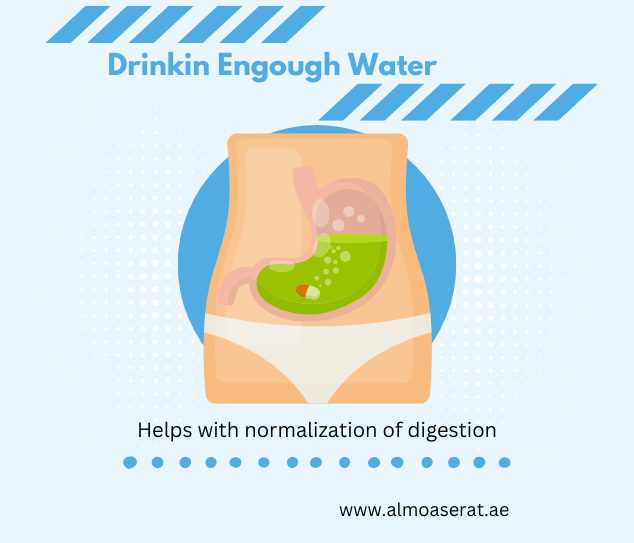Water plays a crucial role in supporting the digestive system in several ways:
- Saliva Production: Water is a primary component of saliva, the fluid produced by salivary glands in your mouth. Saliva contains enzymes, such as amylase, which initiate the digestion of carbohydrates. Adequate saliva production is essential for breaking down food particles and making them easier to swallow and digest.
- Moistens Food: Water helps moisten food as you chew, making it easier to swallow and move through the digestive tract. This is especially important for dry or dense foods.
- Dissolves Nutrients: Water is a universal solvent, meaning it can dissolve many substances, including nutrients from food. This enables the body to absorb these nutrients efficiently in the digestive process.
- Supports Enzyme Activity: Enzymes are essential for breaking down complex molecules in food into smaller, absorbable forms. Water helps maintain the ideal environment for enzymes to function effectively in both the stomach and small intestine.
- Facilitates Nutrient Transport: Nutrients, once broken down in the digestive system, need to be transported through the bloodstream to various cells and tissues in the body. Water is the medium that carries these nutrients through the bloodstream to where they are needed.
- Aids in Bowel Movements: Sufficient water intake helps prevent constipation by softening stools and making them easier to pass through the colon. Dehydration can lead to dry, hard stools, making bowel movements uncomfortable and potentially leading to constipation.
- Maintains Mucus Production: The lining of the stomach and intestines contains a layer of mucus that protects against stomach acid and digestive enzymes. Water helps maintain the production of this protective mucus layer, which is essential for preventing damage to the gastrointestinal tract.
- Regulates Temperature: Water plays a role in regulating body temperature, which indirectly affects the digestive system. Extreme temperatures can stress the body and potentially disrupt digestion. Proper hydration helps maintain a stable body temperature.
- Supports Kidney Function: The kidneys filter waste products and excess substances from the bloodstream, including metabolic byproducts generated during digestion. Adequate water intake ensures the kidneys can effectively eliminate these waste products, promoting overall health and preventing potential kidney stones.
- Prevents Acid Reflux: Water can help dilute stomach acid, reducing the risk of acid reflux (heartburn). Drinking water between meals and maintaining proper hydration can help alleviate symptoms of acid reflux.
It’s important to note that consuming excessive amounts of water with meals can dilute stomach acid and potentially affect digestion negatively. It’s generally advisable to drink water moderately during meals, and it’s often better to hydrate before or after eating.
Overall, maintaining proper hydration is essential for optimal digestive function, and it supports the body’s ability to break down and absorb nutrients from the food you eat.

